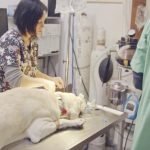Dr. Smolkin discusses alternative therapies for pain and arthritis in dogs and cats and how they can be combined with traditional medicine to see better overall responses in patients. Other topics covered in this video include the use of acupuncture, laser and herbal therapy, joint inflammation, pain management, lameness, glucosamines, natural remedies, osteopathy, willow bark, turmeric, devil’s claw and fish oil omega-3 fatty acids.
TRANSCRIPT:
Hi I’m Dr. Ilana Smolkin here for healthcareforpets.com. Now I’m going to talk about integrated care for pain and arthritis in your pet. I’m going to talk about some of the alternative therapies, things like acupuncture and herbals that you can add into your therapy to see better responses.
First I’m going to go a little bit into detail of what are signs of pain in your pet? There’s the obvious so in the dog you can see an obvious limp, but there’s often really subtle signs that if we can catch these things earlier on in the disease or in the process, we can do a lot better at taking care of.
So sometimes dogs are just a little bit stiff right after they get up and it takes a little bit of time for them to work out of that after they get up from lying down. Sometimes we see a decrease in their enthusiasm for regular activities so maybe they don’t want to play ball anymore or go for a walk or maybe they’re just putting on the brakes halfway through a walk that they used to be able to do with ease. People often report that they’re having trouble either going up or down stairs or sometimes jumping up into the car; they used to be able to get into that hummer no problem and now it’s actually a little bit of a strain and you need to help them up in the back end. Maybe they’re a little reluctant to stretch, so yoga people we’re used to those terms, upward dog, downward dog. Those were named those for a reason because dogs naturally do those sorts of stretches. If they’re not doing those anymore, it could be that their body is tight or that it’s uncomfortable for them to get into those positions.
Cats can be even trickier and I love to talk about cats because cats to be honest, I’m never going to catch in an exam room, they will hide it from me all the time but you might notice things at home and they’re subtle. Maybe they’re not jumping up onto the counter anymore or they’re still getting up there but they need the stool to jump onto first before they can make that higher jump or maybe it’s as simple as they need to almost ramp themselves up and looks like they’re even counting one, two, three before they can take that jump up or down. Cats rarely do a full limp because usually their problems are on both sides. So sometimes it’s as simple as they’re lying down in the same spot every day. Yes cats sleep most of the day, but usually change between five or six locations in the house. If they’re only sleeping on one cushion, on one couch, that could be a sign that they’re uncomfortable. They may also change their eating habits or their grooming habits that they’re not grooming as well or even overgrooming. Some of the skin problems that come to me aren’t skin problems, they’re grooming over a hip or a joint specifically because they’re uncomfortable.
Our ultimate goal is to help get your pet feeling good and back to their regular level of activity and to a point of good health. There are of course lots of good medications out there and your veterinarian can discuss that with you, what’s the most appropriate for your dog or cat or your other pet. What I’m going to talk about more here is some of those integrative things that we can add on top of that to either help reduce the dose of medication or sometimes get them off medication altogether although not always.
The first thing to look at is nutrition and weight. Weight is the most important, everyone thinks that it’s just the weight of the body itself that’s causing more issues and that strain on the joints but fat itself actually gives off hormones that attack the joints and cause inflammation. So it’s really, really important to talk about proper nutrition.
Nutraceuticals there’s lots of them out there for arthritis and pain from glucosamine to omega-3’s, green-lipped mussel and again some of these can work really well either on their own or with each other to help improve that quality of life of your pet and it’s important that you talk things over with your veterinarian. Chiropractic care and other manual therapies, I talk about these more in other videos but this is where I love to treat these pets, these arthritic older animals and I see them starting to stretch normally again and actually kick out after their poops and do what’s a normal range of motion for them and so it can really improve their quality of life and give them a little bit of extra time off medications.
Acupuncture, it’s been used for hundreds of thousands of years in China and ancient medicine and it works great for pain control. Most dogs tolerate it really well and again I go into more detail about acupuncture in another video. Laser therapy is another good option as well. Herbal therapies, there’s tons of herbals out there either from Chinese medicine or traditional medicine or western herbals, things like turmeric, green tea, lots of things that you may even have at home, however, before going and seeing online that you can use these things do talk them over with your regular veterinarian because some of these natural herbals can interfere or interact with medications that your pet might be on and cause that combination to be unsafe.
Often I’ve seen the best success when we can use two or three different modalities from the alternative world combined with medications to try and find what works best for that individual patient and each one responds to each therapy a little bit differently so it sometimes takes working out what is the best therapy for that specific pet because what’s most important to us is your pet’s health here at healthcareforpets.com.








